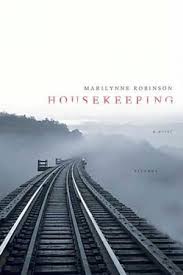Robinson, Marilynne (1980). Housekeeping. NY: Picador
This story is about housekeeping the way that rearranging deck chairs on the Titanic is about required maintenance. First-person narrator Ruthie and her eccentric aunt, Sylvie, go on a frenzied housekeeping spree to impress the neighbors, and the sheriff, with a demonstration that they are responsible and upstanding, and that Ruthie should not be removed from Sylvie’s care and placed in a foster home. But it’s too late for that. The ship is already sinking.
Ruthie has a younger sister, Lucille, and the two of them ran virtually feral when they were young, skipping school and playing alone near a cold, glacial lake somewhere in Montana. Their mother committed suicide by driving her car off a cliff into that lake when they were barely able to understand. Prior to that, a train jumped the tracks on the bridge over the lake and sank irretrievably, taking all the passengers, including their grandfather. So this is no ordinary lake. It is the Lake Of Death. It is the river Styx.
Aunt Sylvie nominally cares for the girls, but she is eccentric and diffident, and the girls continue to run feral until puberty sets in, when Lucille decides she is embarrassed by Sylvie and the decrepit, garbage-filled house they live in, and she runs away to live with a schoolteacher. Nobody seems to mind, but Ruthie is hurt and alone and worried about being abandoned even by Sylvie, until finally, the sheriff knocks on the door.
There is no story; nothing happens. Instead, Robinson paints an impressionistic word portrait of the town, the girls, and Sylvie. The main theme is the girls’ loneliness, of many kinds: from having lost their mother; from being socially isolated from townspeople and schoolmates; from fear of being abandoned by Sylvie, who seems to care about them but provides no direction, either verbal or behavioral. They feel the loneliness of being separated from each other, loneliness of having lost their past, and the threat of ultimate loneliness, death, represented by the ever-present, cold, dark lake.
The greatest success of the novel is in the separation of tone and mood. The narrator’s tone is even and matter-of-fact, even when descriptions are of death, biblical-scale flooding, near-starvation, loneliness, and incredible squalor. There is no whining. Ruthie just tells it like it is. Yet for the reader, the mood feels devastating, dark, constricting, and hopeless. Robinson accomplishes that separation with exquisitely tiny brushstrokes of words. The novel almost, but not quite, falls into the category of prose poetry. You read it for the fine sentences, not because there is any real story.
Drawbacks are several. The language is often very complex and ornate, verging into “purple” territory more than once, and all that from the lips of an undereducated pre-teen, then teenage girl. Her soliloquys often become virtually omniscient, so you are always aware that you are hearing Marilynne Robinson, not Ruthie. Consequently, it’s difficult to identify with the novel’s main character.
Those long, flowery (and ultimately pointless) descriptions often ramble into pseudo-philosophical speculation, often peppered with gratuitous biblical allusions, as is Robinson’s wont, and these digressions struck me as self-indulgences, not informative or poetic contributions to the work.
The book is 90% narrative description. Dialog is extremely rare, and when it does occur, it is usually perfunctory. Consequently we never have much dramatic opportunity to identify with any of the characters, and again, we must settle for Marilynne Robinson.
Finally, Robinson’s pointillistic method will not be to everyone’s liking. For example, the lake and the town are always cold, dark, and wet. Always. Even in the summer. On one page, words like “cold,” “ice,” and “frost” can appear over a dozen times. In one page, these words appear in close succession, “dark,” “darkness,” “black,” “darkness,” “shadow,” and “soot.” Must have been dark, I guess. In one scene, when Sylvie and Ruthie are out on a boat, the word, “boat” appears a dozen times in a page and a half. I found this technique distracting rather than poetic.
Another favorite device is the false tension scenario, when some character goes missing and the worst is feared, but then that character shows up again a few pages later – just went for a walk or something. These numerous little faux-mini-dramas are the only things that keep the forward motion of the narrative from coming to a complete stall.
Despite many such heavy-handed devices, there are often sentences and phrases that stop the eyeballs in their sockets and compel multiple readings.
“For why do our thoughts turn to some gesture of a hand, the fall of a sleeve, some corner of a room on a particular anonymous afternoon, even when we are asleep, and even when we are so old that our thoughts have abandoned other business? What are all these fragments for, if not to be knit up finally?” (p. 92).
“It was a source of both terror and comfort to me then that I often seemed invisible – incompletely and minimally existent, in fact.” (p. 105)
There are enough of those to keep the pages turning right to the end, and after it’s over, to make thoughts and images haunt you for a few days. Aren’t all our lives filled with routine housekeeping, even though we know the ship is sinking?

